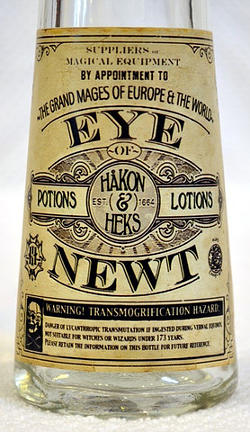 About the only time you’ll hear Christians talking about witchcraft is around Halloween. Then, you’ll be warned why trick or treating is associated with village crones who practiced earth religions and had a thing for mandrake. Loose associations with the Devil will be discussed. Handwringing will be commenced. Dire warnings of hell will be proclaimed. Passive voice will be used. Horrors.
About the only time you’ll hear Christians talking about witchcraft is around Halloween. Then, you’ll be warned why trick or treating is associated with village crones who practiced earth religions and had a thing for mandrake. Loose associations with the Devil will be discussed. Handwringing will be commenced. Dire warnings of hell will be proclaimed. Passive voice will be used. Horrors.
Specks, actually.
And by that, I mean this speck:
“Why do you see the speck that is in your brother’s eye, but do not notice the log that is in your own eye? Or how can you say to your brother, ‘Let me take the speck out of your eye,’ when there is the log in your own eye? You hypocrite, first take the log out of your own eye, and then you will see clearly to take the speck out of your brother’s eye.”
—Matthew 7:3-5 ESV
If you’ve been a Christian even a couple months, you’ve probably read or heard that passage. It’s common. But how often do we see the relevance?
I find it interesting that Halloween and Reformation Day coincide. Protestant Christians celebrate the day that Martin Luther pounded his complaints against the unbibilical practices of the Roman Catholic Church to the door of his local Catholic cathedral, thus kicking off the Protestant Reformation.
The key to the Reformation was the Gospel. Somehow, buried beneath all the crap of religious performance and “do this and don’t do that” pseudo-Christianity, the truth that Christ brought with Him in Himself mouldered, dormant. What came of the Reformation is that many a Christian died to resurrect that neglected truth.
The Presbyterian Church arose due to the Reformation. The Presbyterians have long been a church that gets the authority of the Bible correct, one of the hallmarks of Reformation thinking and the rediscovery of the Gospel of Grace.
So yesterday, I’m listening to a podcast from a noted Presbyterian church, and the speaker is telling me that effective prayers follow the format that King David prayed in the Psalms. That God answers the kinds of prayers that are humble, that start by invoking God’s name, that mention God’s glory before anything else is prayed. To be an effective prayer, one must pray that prayer with a specific attitude, that the prayer cannot be too needy or too self-centered, so it must contain little of oneself and a whole lot of what is not oneself.
I listened to that podcast for a half hour as the preacher went on and on about how to pray perfectly before I finally had enough and switched it off.
Since we started with a reference to witchcraft, let’s do a little comparison:
Witch thinking: For me to get what I want from the elemental spirits of the earth, my potion needs to brewed under a full moon and have mummified bat wings, a drop of hippopotamus sweat, some tincture of hemlock, and a hint of eye of newt. Stir for an hour counterclockwise while envisioning the outcome. I should probably be naked while I concoct it, too.
“Christian” thinking: For me to get what I want from God, my prayers need to be done in the morning, and I should praise God first, then follow the pattern of King David in the Psalms, sprinkle in the prayer of Jabez for certainty, and pray with faith, while also being humble, with totally pure motives, thus being naked in spirit before the Lord.
Between you and me, I’m not sure I see the difference. Both are formulas designed to get something from a power, which will only happen if performed and brewed correctly by the supplicant. And we know what the formula and ingredients are, because the pastor told us on Sunday.
Earlier, we saw the speck. There’s the log.
I don’t know about you, but I can’t even do a grocery list right. I write down a dozen items, shop for an hour, and still come home missing the corned beef and mayonnaise. How in the heck am I going to get the “10 Steps for a Perfect Christian Marriage” right? How will I recall the “12 Keys to Raising Godly Children”? I mean, even if I get it right Monday, Tuesday is another day.
What if I forget the eye of newt?
I can understand why a lot of people don’t want to go to church anymore. Too much of what we give people resembles a spellbook. If we just combine the right ingredients the right way, the way the pastor and elders say, a perfect life will pop out of the cauldron.
But what we don’t ever allow for is the frailty and fallenness of human beings. We don’t give people a way to be real and flawed.
The truth is, I’m never going to go into prayer with pure motives because nothing about me is pure, ever.
I’m not going to remember how David or Hezekiah or Jesus prayed. And I’m not going to perfectly replicate their life situation at the time of that prayer either.
I’m not going to recall the steps for doing such and such the godly Christian way. Heck, I’m not sure where I parked the car in the church parking lot.
I’m not always going to be on. Sometimes, I’m going to be off. Most of the time, honestly.
We no longer appear to understand those truths about ourselves. The Reformation? The Gospel of Grace? What are those? Somehow, we Christians today are reburying the Gospel under a pile of performance-based crap to moulder for some other generation to find.
A reminder of what that Gospel is: Jesus did it all perfectly so we don’t have to.
We don’t have to gin up perfect motives when we come to God in prayer because Jesus’ motives were always perfect.
We don’t have to say the formula perfectly because Jesus said it all, and just in the right way.
We don’t have to get the order and ingredients right because Jesus took care of everything for us.
If we’re in Jesus, we’re set. It is finished. Jesus did it all. Period.
People are lost because they’re still trying to make the recipe themselves, the way they think it should be, if they can find that recipe at all. For the Christian, none of that matters. Finished, all of it.
I don’t know about you, but I don’t need to go to church to hear how I’m doing it wrong and need to fix my recipe. I need to hear how Jesus perfectly did it all for me, so I no longer need to worry about getting it right, ever.
Because that’s the Gospel. That’s the Good News. That’s the Bible being used the right way, to tell the story of Jesus and what He did for you and for me so we can stop all our striving and rest in Jesus’ finished work—not the wrong way, as the ingredient list and formulas we need to spell up the solutions to our problems.
Because the real witchcraft is relying on ourselves to get it done and done right. And that’s not just relegated to Halloween but to nearly every day of most people’s lives, even far too many “Christian” lives.

 At the story’s conclusion, Wonka gives his factory to Charlie. And it’s not simply because the boy is the last one standing on the tour but because of Charlie’s humble, gentle, others-centered spirit. Wonka realizes the boy has something he lacks. In the same way, Charlie not only inherits the candy plant, but he also must realize that to continue to make it great, it must retain its weirdness, and he must move beyond being just a destitute, simple boy to embrace some of Wonka’s madness. For the world to become a more wonderful place, both Wonka and Charlie must break out of their ghettos.
At the story’s conclusion, Wonka gives his factory to Charlie. And it’s not simply because the boy is the last one standing on the tour but because of Charlie’s humble, gentle, others-centered spirit. Wonka realizes the boy has something he lacks. In the same way, Charlie not only inherits the candy plant, but he also must realize that to continue to make it great, it must retain its weirdness, and he must move beyond being just a destitute, simple boy to embrace some of Wonka’s madness. For the world to become a more wonderful place, both Wonka and Charlie must break out of their ghettos.